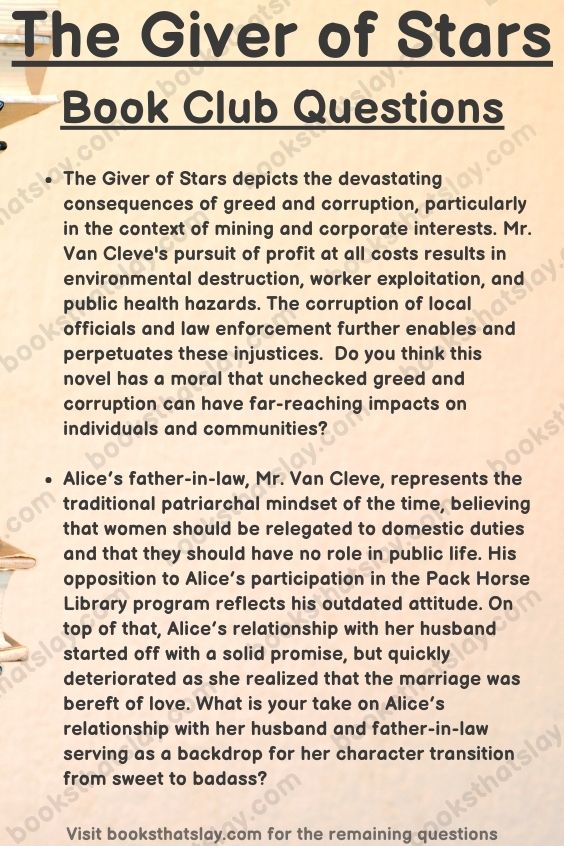10 The Giver of Stars Book Club Questions
Imagine a time when women were expected to conform, when dreams were often confined to domesticity. Now, picture five extraordinary women who dared to break free.
Jojo Moyes’ The Giver of Stars transports us to the harsh beauty of Depression-era Kentucky, where Alice Wright, an Englishwoman escaping a stifling life, finds unexpected purpose. As a Packhorse Librarian, she and her fearless companions navigate treacherous terrain, facing danger and prejudice to deliver books to isolated communities.
Together, we’ll explore the power of friendship, the resilience of the human spirit, and the transformative impact of knowledge.
Let’s delve into this inspiring tale and uncover the extraordinary women who defied convention, one question at a time.

The Giver of Stars Book Club Questions
- The isolation of the Appalachian mountain communities and lack of access to resources is a major reason why the WPA Pack Horse Librarians of Kentucky program was established. The women who participated in the program faced challenges not only from the difficult terrain but also from the conservative mindset of the people who resided there. The program also represented a source of empowerment for women during a time when they were expected to conform to traditional gender roles.
Do you think this program and its impact on the community served as a backdrop for the personal struggles and growth of not just Alice but the other characters as well?
- Alice’s father-in-law, Mr. Van Cleve, represents the traditional patriarchal mindset of the time, believing that women should be relegated to domestic duties and that they should have no role in public life. His opposition to Alice’s participation in the Pack Horse Library program reflects his outdated attitude. On top of that, Alice’s relationship with her husband started off with a solid promise, but quickly deteriorated as she realized that the marriage was bereft of love.
What is your take on Alice’s relationship with her husband and father-in-law serving as a backdrop for her character transition from sweet to badass?
- The deep-seated hatred between the O’Hares and the McCulloughsis is based on past events, which are alluded to but never fully explained. The feud is destructive, causing violence and discord in the community. It also creates tension between Margery and Clem, leading to his mysterious death of the latter and Margery’s subsequent arrest.
What’s your take on the way the feud between the two impact the story, and what does it say about the power of grudges and forgiveness?
- Beth recognizes the discrimination and danger Sophia faces as a black woman in a white town and actively works to support and defend her. In turn, Sophia offers Beth quiet encouragement and advice, showing that women can find strength and empowerment in each other even in the face of adversity.
Discuss how this friendship illustrates the importance of solidarity among women during oppressive circumstances?
- Alice starts as a naive, hopeful bride who quickly realizes that her dream of a new life in America is not going to come true. As she becomes involved with the Pack Horse Library, she gains confidence and a sense of purpose, and she becomes more aware of the injustices in her community. She becomes more independent and assertive, taking on new responsibilities with the library and developing a close friendship with Margery.
Do you think the novel was an ode to Alice finding her sense of happiness and fulfillment, both personally and professionally?
- The Pack Horse Library provides access to books and reading material to people who would not otherwise have it. This opens up new opportunities and perspectives for many of the deprived bibliophiles. The books they deliver promote literacy and education, and provide a way for people to connect and share ideas.
Discuss how the library eventually becomes a symbol of resistance and defiance against the patriarchal and oppressive attitudes of the town’s leaders. Also discuss how the author portrays the power of literature as having the ability to change people’s lives and challenge the status quo.
- Margery’s relationship with Sven changes throughout the story, from initial animosity and distrust to a deepening connection and eventual marriage. Sven is initially hesitant to trust Margery because of her family’s reputation and her defiance of Mr. Van Cleve. However, he becomes a steadfast ally and supporter of Margery as he gets to know her better and sees her strength and resilience in the face of adversity.
Discuss the character transition of Margery throughout the novel.
- Beth is physically strong and capable, able to hold her own on a farm full of brothers and even secretly making moonshine to fund her dream of traveling to India. By defying expectations and rejecting traditional feminine roles, Beth asserts her own agency and independence.
Discuss how Beth’s character challenges traditional gender roles and expectations back in those days.
- Izzy’s disability from polio initially leaves her feeling shy, and unhappy, embarrassed by her inability to walk without limping. However, her work with the Pack Horse Library gives her a sense of purpose and fulfillment, and she becomes a strong supporter of the group. Izzy’s disability also gives her a unique perspective on the challenges faced by the rural residents she serves, and her beautiful singing voice becomes a crucial tool for rallying and uplifting her fellow librarians.
Discuss how Jojo Moyes brought out the talent of Izzy instead of showcasing her as disabled person.
- The Giver of Stars depicts the devastating consequences of greed and corruption, particularly in the context of mining and corporate interests. Mr. Van Cleve’s pursuit of profit at all costs results in environmental destruction, worker exploitation, and public health hazards. The corruption of local officials and law enforcement further enables and perpetuates these injustices.
Do you think this novel has a moral that unchecked greed and corruption can have far-reaching impacts on individuals and communities?
If you liked this set of questions, here are some other options for you to explore.